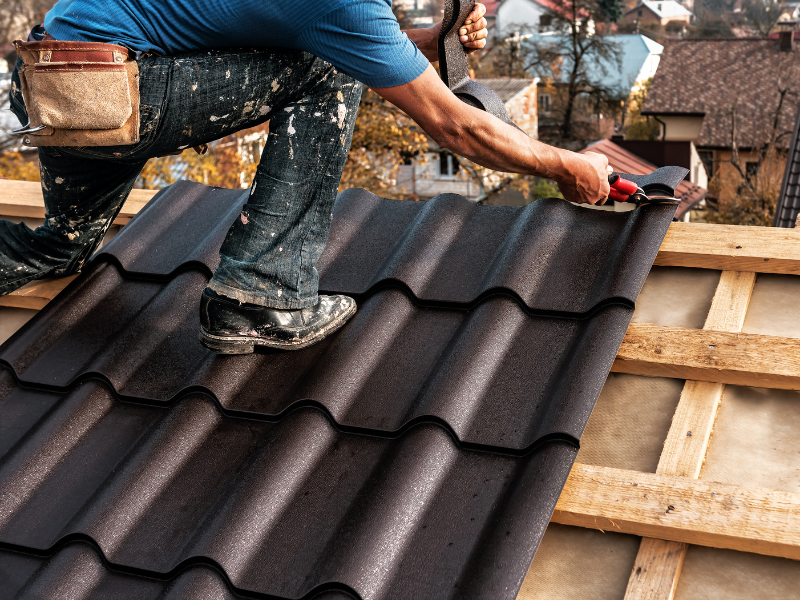When a roof starts showing signs of wear or sustains storm damage, homeowners are faced with a critical decision: roof repair or full replacement? Both options have their merits depending on the extent of the damage, the age of the roof, and the type of roofing materials used. However, one of the most important — and often confusing — aspects of this decision is what your insurance will cover.
In this blog, we’ll break down the key differences between roof repairing and replacing, when each option is best, and how to navigate the tricky terrain of insurance coverage.
Disclaimer: Always review your specific homeowner’s insurance policy and consult your insurance provider for details on your coverage. This article is intended for general informational purposes only.
Understanding the Differences: Roof Repair vs. Roof Replacement

A roof repair addresses isolated issues — such as damaged shingles, minor leaks, or flashing problems — without replacing the entire roof. This option is generally faster, less expensive, and ideal for newer roofs with localized roof damage.
A roof replacement, on the other hand, involves tearing off the entire roofing system and installing a new one. This is often necessary when:
- The roof is nearing the end of its expected lifespan (e.g., 20-30 years for asphalt shingles)
- There is extensive or structural damage
- The roof has been repaired multiple times already
If your roof has multiple layers, some roofing companies may suggest a full replacement rather than another patch job, especially if your local code only allows a certain number of layers.
Deciding Whether to Repair or Replace
Here are some key factors to consider when deciding whether to repair or replace your roof:
1. Age of the Roof
Older roofs nearing the end of their life cycle typically benefit more from a roof replacement than a repair. Trying to extend the life of an aged roof with frequent repairs may cost more in the long run.
2. Extent of Damage
Minor roof damage such as a few missing shingles or a small leak may only require roof repair. However, widespread damage — especially from hail, wind, or falling debris — could indicate underlying issues that necessitate a full replacement.
3. Cost Considerations
While roof repair is initially less expensive, a patchwork approach can add up over time. A new roof replacement may offer better long-term value, especially when covered partially or fully by insurance.
4. Type of Roofing Materials
Some roofing materials, like metal or tile, can last significantly longer and may be more cost-effective to repair. However, common systems like asphalt shingles tend to show wear more visibly and may need replacement after 15-30 years, depending on climate and maintenance.
What Insurance Will Cover
Homeowners insurance can be a major help in financing roof repairs or replacements — but it depends on the cause of the damage and the specifics of your policy.
Typically Covered by Insurance:
- Sudden and accidental damage from events like hailstorms, high winds, or falling trees
- Fire damage
- Vandalism
Typically Not Covered:
- Wear and tear due to age
- Neglect or lack of maintenance
- Improper installation by unqualified roofing companies
- Cosmetic issues not affecting functionality
Insurance may cover a roof replacement only if the damage is deemed significant enough and not caused by normal aging. Some insurers will pay for only a partial repair, especially if only a section of the roof is affected.
Tips for Navigating Insurance Claims

- Document everything. Take clear photos and videos of the damage immediately.
- Hire a reputable contractor. Choose licensed roofing companies like Kaphar Construction who are experienced in working with insurance adjusters.
- Request a roof inspection. A professional assessment helps determine the true extent of the roof damage and whether you need a roof repair or full replacement.
- Review your policy. Understand the difference between actual cash value (ACV) and replacement cost value (RCV) coverage.
- File your claim promptly. Most policies require claims to be filed within a certain window after the event.
At Kaphar Construction, we specialize in helping homeowners make smart decisions about roof repair and replacements. Whether you need a second opinion on a repair estimate or help filing an insurance claim, our team is here to walk you through every step.
We use high-quality roofing materials, offer honest assessments, and work with all major insurance providers. When you need to choose between roof repair and roof replacement, let us help you make the right call for your home and your budget.
